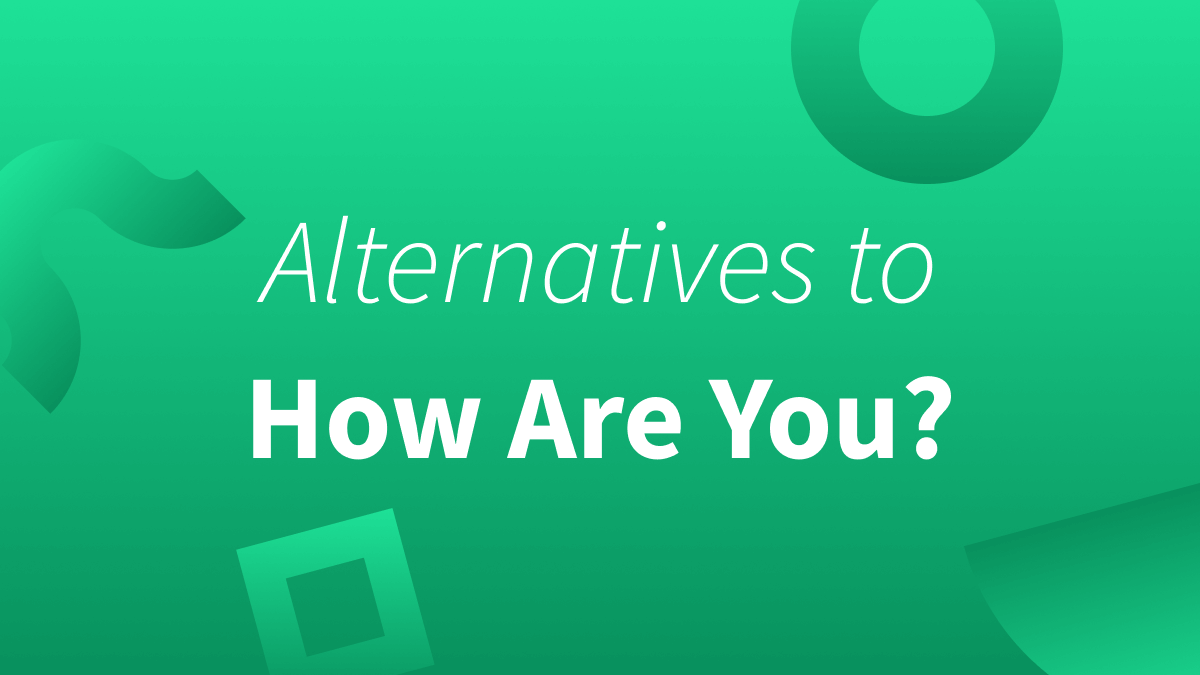“How Are You?” Alternatives
- How are you? is a phrase English speakers use when greeting each other. A few alternatives you can use instead are:
- If you actually want to initiate a conversation, there are other phrases that are much more effective than how are you?
- ○ How are things going?
- ○ What’s new?
- ○ What’s up?
- ○ How have you been?
- ○ How’s everything?
What’s the Deal With “How Are You?”
How are you? is a phrase English speakers use to greet each other. What’s unusual about this phrase is that a majority of the time when it’s used, the speaker doesn’t actually expect a comprehensive or even honest answer.
People often use how are you? anticipating a response like I’m well, I’m alright, or I’m okay. Answer sincerely, and you might just end up on the receiving end of a perplexed look.
How are you? is like the greeting hello in that it’s generally meant to be a short and simple salutation. We can’t tell you why this is the case, but we can provide alternatives that can suit whatever scenario you’re looking for, whether it be a brief response or the start of a conversation. Below you’ll find ten other ways to say how are you?

Alternatives to “How Are You?”: Keeping It Brief
The following alternatives to how are you? are perfect for when you want a brief response, like when you bump into an acquaintance in an elevator and have to make small talk. Most of the time, the recipient will answer with a short, simple answer.
1. How’s it going?
Think of how’s it going? as translating to how is life going? Like how are you?, people who use this phrase as a greeting usually expect a short answer. This alternative tends to be used in informal situations.
2. What’s new?
When someone uses what’s new? they’re asking for any quick life updates you’d like to share, if any. You can either reply with a typical answer or add a brief update. Use this alternative with friends, colleagues, and other people you have met before.
3. What’s up?
This is a very popular phrase you can use in place of how are you? However, keep in mind that this phrase is typically not used in formal settings. An even more formal and colloquial way of saying what’s up is sup?
4. How have you been?
How have you been? can work in formal and informal situations. Use this alternative when you’re greeting someone you’ve already met, but haven’t seen in quite some time.
5. What’s going on?
This informal alternative to how are you? is a great way to greet someone you already know. Like how are you, native English speakers usually don’t elaborate on what’s really going on in their life.
Alternatives to “How Are You?”: Ready for a Conversation
On the opposite side of the spectrum, some people actually do want to start a conversation. How are you? is not the best greeting to use if that’s what you’re seeking. If you want to start an authentic conversation with someone, try the following phrases instead:
6. What are you doing today?
While how are you? gets you a two-word answer, what are you doing today? invites the person to tell you about the plans for their day. You’d probably hear this alternative among friends, family, or colleagues.
7. What’s new with ______?
Use this alternative with people you already know on a personal level and add a personal touch. For instance, if the person you’re starting a conversation with has recently bought a house, ask about that: What’s new with the house?
8. How are you feeling today?
How are you feeling today? is similar to how are you?, but more sincere. This question makes it clear to the recipient that you’re truly curious about how they are feeling, not just saying hi and bye in passing.
9. What’s on your mind this morning/afternoon/evening?
This alternative encourages the recipient to have a conversation and open up about what’s on their mind. As you might have guessed, using this morning, afternoon, or evening depends on the time of day.
10. How are you holding up?
How are you? signals inauthenticity. How are you holding up?, on the other hand, lets the recipient know that it’s okay for them to be truthful, even if things are difficult for them at the moment. Use this alternative when you know that someone has been going through a difficult time.
What’s New With Your Writing?
While these alternatives are often used while speaking, they can also be used when you’re writing to someone, whether it be in an email, text message, or even a written letter. LanguageTool can ensure your spelling, grammar, and fluency are top-notch. Try it today.

